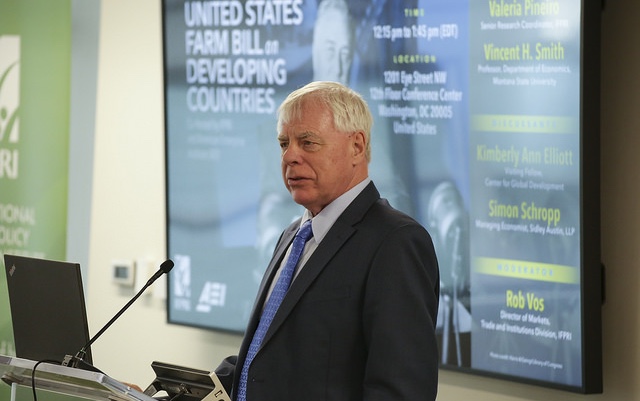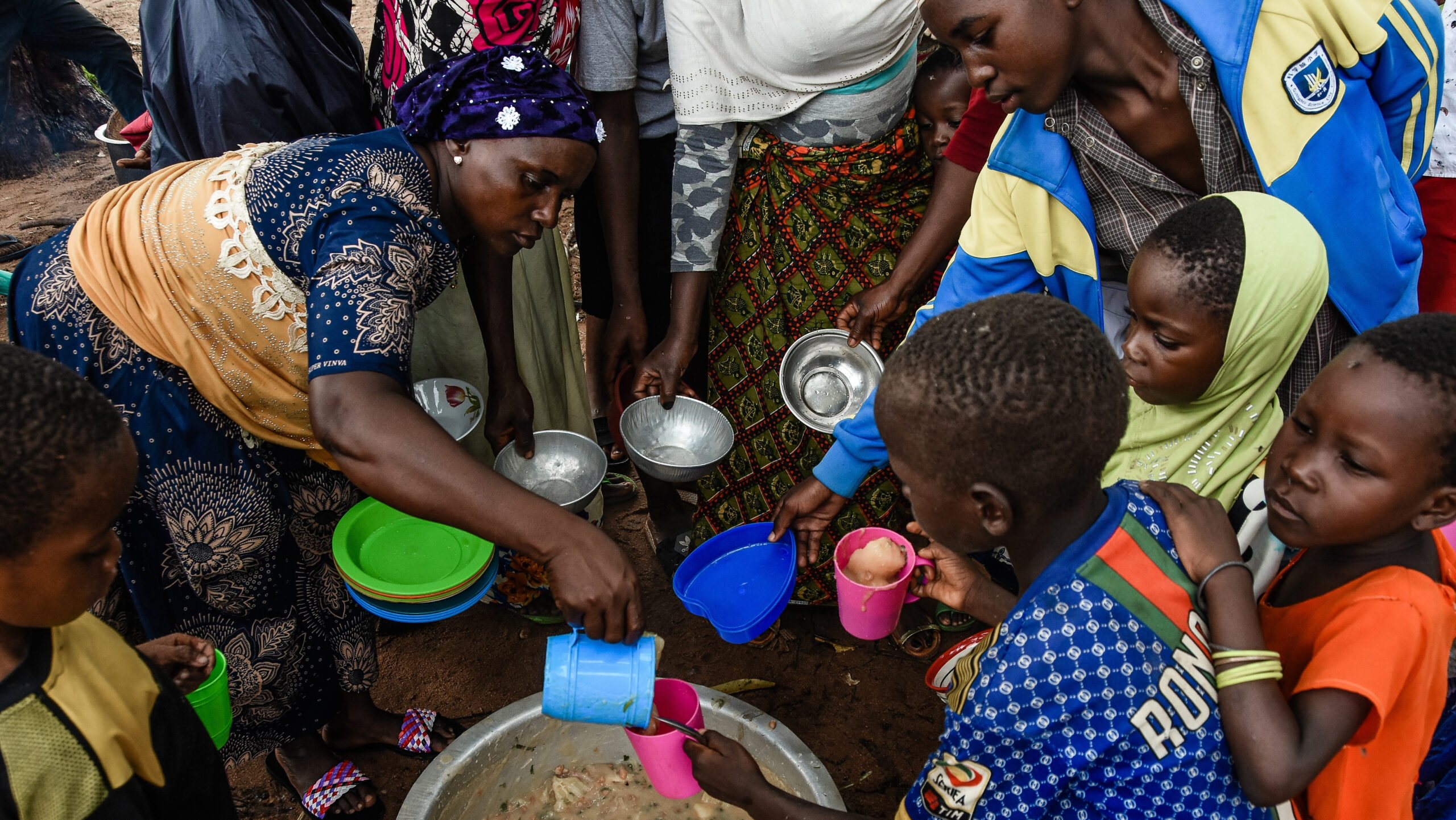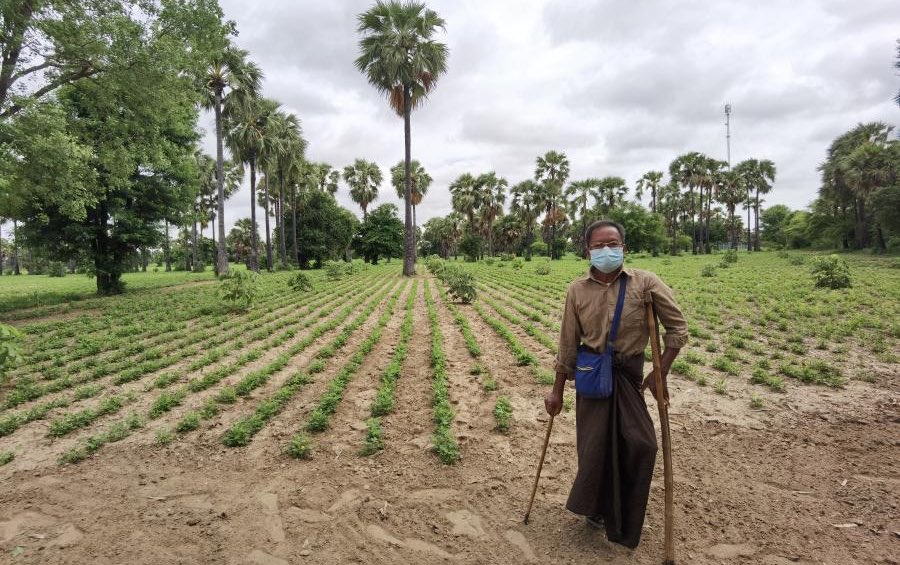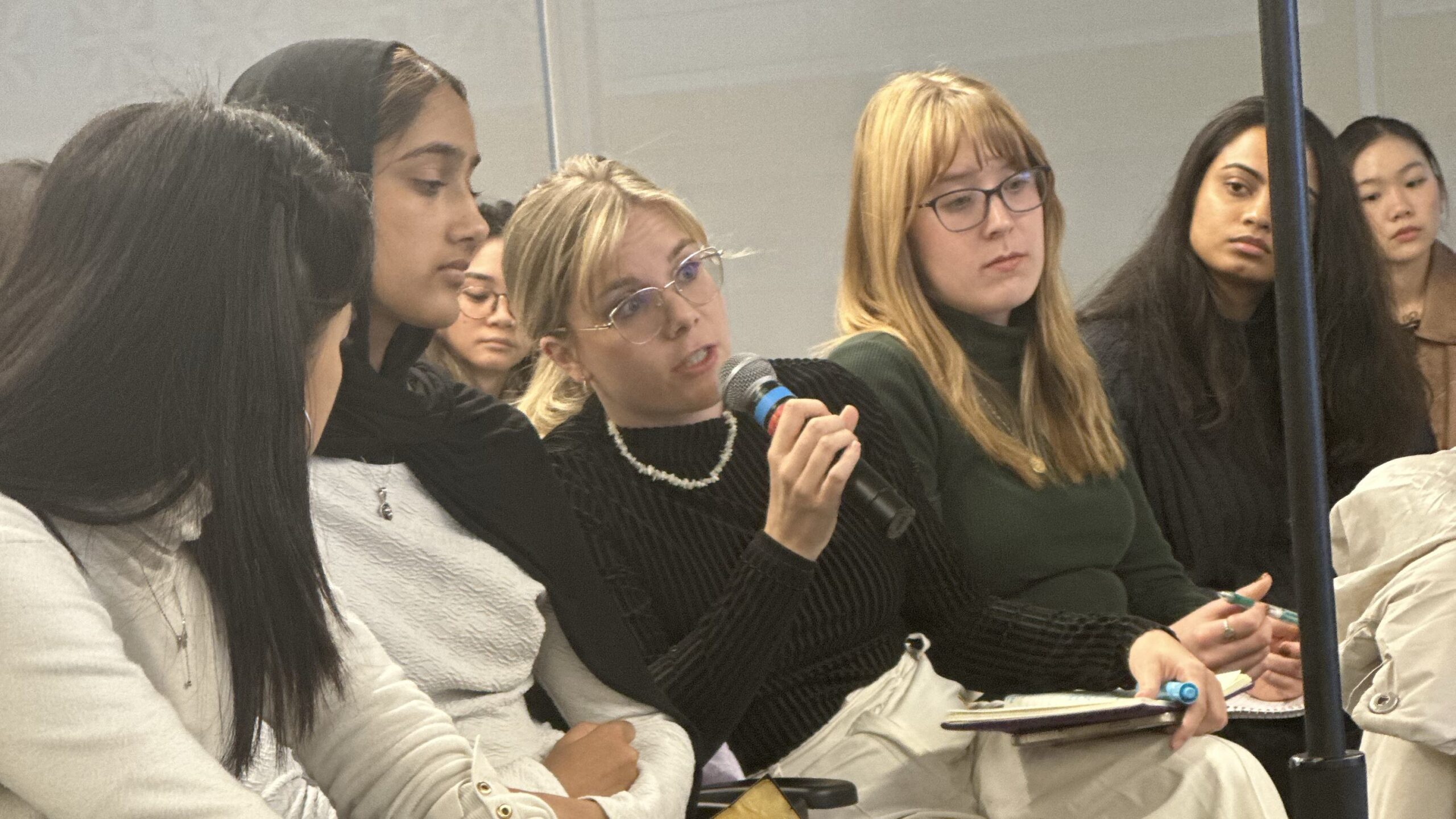The U.S. Congress has recently started debate on the structure and content of the 2018 farm bill, which will determine agricultural policy and spending from 2019-2023. While nominally a domestic policy, the farm bill has far-reaching implications for farmers around the world and for consumers and producers along the entire agricultural value chain.
At a recent IFPRI policy seminar, experts gathered to discuss the potential impact of the bill on developing countries, as well as on the upcoming WTO Ministerial Conference in Buenos Aires in December. The event was held in conjunction with the American Enterprise Institute (AEI), which plans to publish a series of 17 papers discussing the farm bill; two of these papers were discussed at the event
Joseph Glauber, senior research fellow in IFPRI’s Markets, Trade and Institutions Division, said that since 2000, total global agricultural trade has nearly tripled, and developing countries’ share of agricultural trade has grown by one-third. Much of this latter growth has been South-South (for example, increased soybean exports from Brazil to China). In the U.S. agricultural trade has grown as well, with exports reaching a record high in 2014. The top destinations for U.S. agricultural exports are China, Canada, and Mexico. U.S. agricultural imports have also expanded, particularly from Mexico, Canada, and the European Union. According to Glauber, this increased trade integration validates concerns over the proposed renegotiation of NAFTA and potential trade wars with China and the potential impacts on producers and U.S. consumers.
“Oftentimes when we talk about these free trade agreements, and what would be lost by a trade war, we tend to focus on producers, but in fact, consumers are the ones that are the real losers,” Glauber said.
U.S. farm and trade policies have significant inconsistencies, Glauber said. The U.S. has made progress in recent decades in reducing trade-distorting agricultural policies, he said, but distortions still remain. For instance, the relatively high degree of support for selected commodities (e.g., peanuts, cotton, wheat, corn, rice, and soybeans) makes the U.S. particularly vulnerable to challenges to unfair trade policies by other countries under the WTO Dispute Settlement Body. “When you see support levels accounting for a large percent of production value,” Glauber said, “that’s a sign that other countries may be able to start investigating a bit.”
Vincent Smith, a professor of economics at Montana State University, echoed Glauber, saying U.S. policies were also inconsistent on food aid. Even though food aid makes up only 0.1 percent of total U.S. agricultural production, the government imposes a number of stringent regulations on it. Currently, for instance, the U.S. requires that almost all food aid products must be grown domestically, and at least 50 percent of food aid must be transported on U.S.-flagged ships. The U.S. also still maintains monetization policies: NGOs purchase food grown in the U.S., ship it to and sell it in countries in need, and then use the profits to fund food security programs. All of these policies, Smith said, translate into wasteful and inefficient aid.
For example, cargo preference policies increase the cost of delivering food aid by $50-$60 per ton; combined with mandatory sourcing from the U.S., cargo preferences add $300 million-$400 million to the total annual cost of food aid. These policies also reduce the impact of food aid. Without them, Smith said, an additional 4 million to 10 million people per year could benefit from food aid and its delivery could be sped up by as much as 14 weeks. This would make an enormous difference for recipients, especially children. “The lives of 40,000 kids per year are essentially lost because of the inefficient use of food aid,” Smith said. “These are pretty devastating numbers.”
Valeria Piñeiro, senior research coordinator in IFPRI’s Markets, Trade and Institutions Division, focused on the role that domestic agricultural support measures will play in the upcoming WTO talks in Buenos Aires. Developing countries’ rising share in global trade is making them more relevant players in multilateral trade negotiations, she said. They have also increased spending on overall trade-distorting supports (OTDS) in recent years. Developing countries have favored non-product-specific support, while developed countries tend to focus on product-specific subsidies. In this context, several key ideas have been set forth prior to the WTO Ministerial. One focuses on essentially keeping in place the existing WTO framework to use as a starting point for this year’s agricultural and trade negotiations. Another idea aims to set an overall cap on countries’ OTDS expenditures. A third idea aims to set product-specific caps on OTDS expenditures in order to avoid excessive product concentration of support in important commodities. For the latter two proposals, how OTDS should be defined and measured remains to be determined.
To examine each of these proposals, Piñeiro, Glauber, and fellow IFPRI researcher David Laborde ran a series of four scenarios using the MIRAGRODEP model, a global Computable General Equilibrium Model. Results show that the policy space for developing countries will be wider than for developed countries. In addition, all of the scenarios analyzed would deliver lower OTDS limits that bind AMS (total aggregate measure of support) for developed countries and for developing countries that have an AMS commitment.
A scenario that includes a cap on product-specific support measures would have the largest impact on global commodity prices, particularly pushing those of cotton and wheat higher. Product-specific caps would also have the largest impact on the volume of goods traded; again, in this scenario, cotton and wheat would see the largest increase in trade, but trade in livestock and sugar would also grow as countries increase imports to meet domestic consumption needs. Under all of the examined scenarios, farm production in developed countries as a group would decrease, while farm production in developing countries as a group would increase.
“When we’re talking about domestic support negotiations, for some developed countries, it will be hard to talk about this at home because there are limited economic gains that can be outweighed by the political cost,” Piñeiro warned.
However, while reform of WTO support policies may negatively impact some countries’ terms-of-trade, depending on whether they are an importer or exporter of commodities benefiting from potentially large price increases in world markets, these reforms will also lead to gains in market efficiency arising from reduced domestic distortions. These will help readjust countries’ factors of production and direct their use of natural resources to sectors and products in which they have stronger comparative advantages, she noted. These efficiency gains can help mitigate trade-related losses. Piñeiro also suggested broadening domestic support negotiations, such as including increased market access, in order to generate still larger efficiency gains. In advanced economies, she added, reducing costs for food processing industries and non-agricultural sectors can help to balance the overall agreement and make reform more politically palatable.
Discussant Kimberly Ann Elliott of the Center for Global Development noted the fact that U.S. trade policy in general has inherent structural inequalities that negatively impact poor populations both within the country and abroad. The U.S. places its highest tariffs on essential items such as food, clothing, and footwear, she said; this is particularly true for lower cost items. These tariffs not only make important goods more expensive for poor domestic consumers; they also reduce market access for many developing countries. For example, U.S. tariffs on sugar and dairy products have limited market access for the West African chocolate industry. She suggested that excise taxes could be a more efficient policy tool to increase the price of goods without imposing destructive tariffs on poor countries. Elliott emphasized that import quotas have often not been addressed in multilateral negotiations and that more effort should be made on that front at the WTO talks.
Discussant Simon Schropp of Sidley Austin, LLC, focused on the international trade implications of U.S. domestic support policies. He agreed with Glauber that the U.S. likely faces more WTO disputes, saying the U.S. is “eminently vulnerable to WTO challenges due to the distorting effects it has on world commodity markets.” He also expressed concern that current WTO negotiations may not be taking into account the latest developments in domestic support programs, such as the increased use of crop insurance in place of production-centric measures.
Rob Vos, the event moderator and director of IFPRI’s Markets, Trade and Institutions Division, concluded by emphasizing the complex nature of U.S. agricultural policies, as well as the difficulties inherent in making the right kind of changes to both domestic and multilateral WTO policies to ensure that developing countries are able to equitably participate in the global trading system.
Sara Gustafson is a Communications Specialist with IFPRI’s Markets, Trade and Institutions Division.







